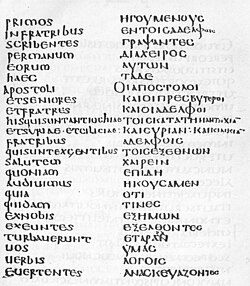Acts 14
Chapter of the New Testament From Wikipedia, the free encyclopedia
Chapter of the New Testament From Wikipedia, the free encyclopedia
Acts 14 is the fourteenth chapter of the Acts of the Apostles in the New Testament of the Christian Bible. It records the first missionary journey of Paul and Barnabas to Phrygia and Lycaonia. The book containing this chapter is anonymous but early Christian tradition uniformly affirmed that Luke composed this book as well as the Gospel of Luke.[1]
| Acts 14 | |
|---|---|
 Acts 15:22–24 in Latin (left column) and Greek (right column) in Codex Laudianus, written about AD 550. | |
| Book | Acts of the Apostles |
| Category | Church history |
| Christian Bible part | New Testament |
| Order in the Christian part | 5 |
The original text was written in Koine Greek. This chapter is divided into 28 verses.
Some early manuscripts containing the text of this chapter are:
This chapter mentions the following places (in order of appearance):
The first missionary journey of Paul and Barnabas took place about AD 47–48.[5]

Paul and his companions went out of Antioch in Pisidia to the east, apparently following the Roman road (Via Sebaste) which connects the Roman colonies of Antioch, Iconium (modern: Konya; 150 kilometres (93 mi) to the southeast) and Lystra (30 km further to the southwest).[6] Although the initial responses of both Jews and Greeks in the Iconium synagogue is positive (verse 1), the account focuses less on the church's foundation story, and more on the repeated opposition from "unbelieving Jews" or (in the aorist tense) "Jews who had decided against belief" in these cities.[7]
This man's needs and circumstances match those of the man healed by Peter and John in Acts 3:2.[9] Theologians Matthias Schneckenburger, Ferdinand Christian Baur, and Eduard Zeller considered that this narrative originated "from an imitation of the narrative of the earlier Petrine miracle in chapter 3".[10]
The Roman poet Ovid told of an ancient legend in which Zeus and Hermes came to the Phrygian hill country disguised as mortals seeking lodging. After being turned away from a thousand homes, they found refuge in the humble cottage of an elderly couple. In appreciation for the couple's hospitality, the gods transformed the cottage into a temple with a golden roof and marble columns. All the houses of the inhospitable people were then destroyed. This ancient legend may be the reason that the people treated Paul and Barnabas as gods. After witnessing the healing of the cripple, they did not want to make the same mistake as their ancestors.[12] Ancient inscriptions confirm the existence of the local pre-Greek language ("Lycaonian") in that period, as well as the joint worship of Zeus and Hermes in the area.[13]
With this verse there is an "abrupt return" to summary mode and to the theme of Christian persecution.[7] Although the stoning of Paul was undertaken by "Jews from Antioch and Iconium", Henry Alford suggests that "they stoned him, not in the Jewish method, but tumultuously and in the streets, dragging him out of the city afterwards".[15] Paul refers to the event in 2 Corinthians 11:25.[15]
After Paul had been stoned and supposed dead in Lystra (verse 19), he and Barnabas departed the next day for Derbe (Greek: εξηλθεν ... εις δερβην; 100 kilometres (62 mi) to the southeast of Lystra).[6] Many translations render this text as 'and on the next day he went on with Barnabas to Derbe',[17] implying they traveled within one day, but as it is about 60 miles from Lystra to the likely site of Derbe, Bastian van Elderen has stated that Acts 14:20 must be translated as 'on the next day he set out with Barnabas towards (or for) Derbe'.[18]
From Derbe, Paul and Barnabas began the journey back to Antioch, Pisidia, while consolidation of the newly planted churches along the way: 'strengthening the soul and encouraging believers to remain in the faith (verse 22) in person as Paul later does with his letters (cf. 1 Thessalonians 2:14—16; 3:2—4).[7] The term "Elders" (Greek: πρεσβυτέρους, presbyterous) is used by Paul as church officials in the Pastoral epistles (Titus 1:5; 1 Timothy 5:17,19), along with another term episkopoi (Acts 20:28; cf. Philippians 1:1).[7]
This section records the conclusion of the journey, tracing the traversed region along the land road until reaching Attalia, where they sailed to Seleucia, the sea port of Antioch in Syria (verses 24–26). The missionary church received a 'formal report' on the accomplished work (verses 26–27), especially the opening of a 'door of faith' for the Gentiles (cf. 2 Corinthians 2:12).[7]
Seamless Wikipedia browsing. On steroids.
Every time you click a link to Wikipedia, Wiktionary or Wikiquote in your browser's search results, it will show the modern Wikiwand interface.
Wikiwand extension is a five stars, simple, with minimum permission required to keep your browsing private, safe and transparent.